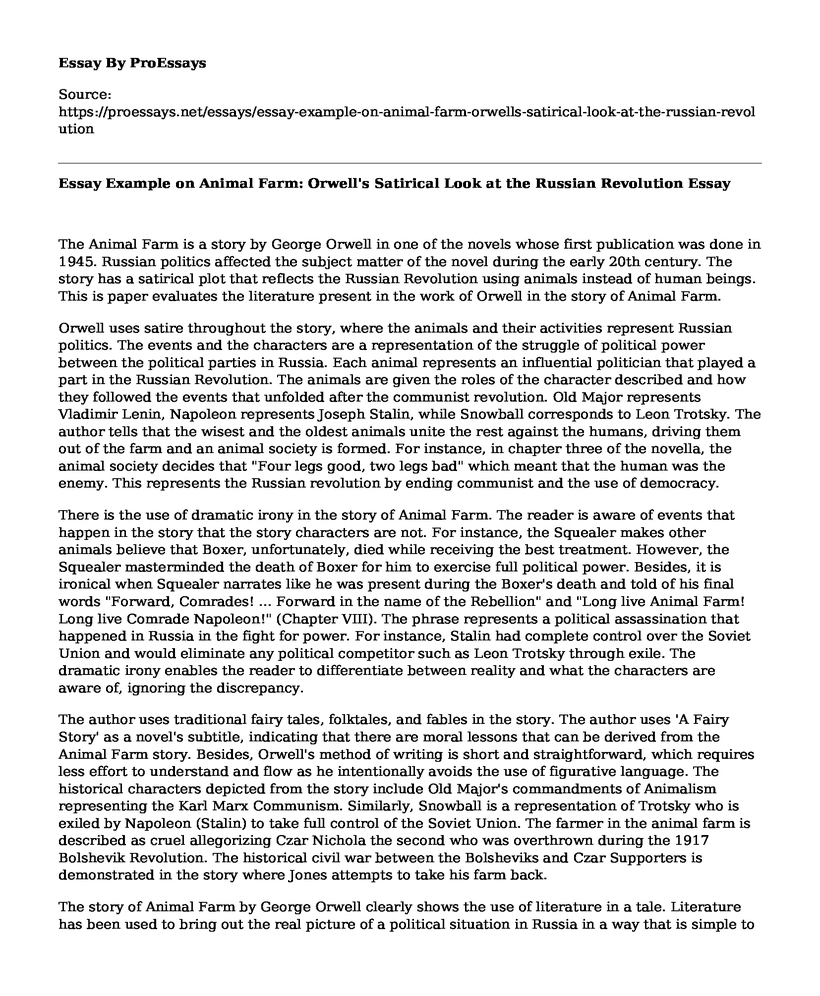The Animal Farm is a story by George Orwell in one of the novels whose first publication was done in 1945. Russian politics affected the subject matter of the novel during the early 20th century. The story has a satirical plot that reflects the Russian Revolution using animals instead of human beings. This is paper evaluates the literature present in the work of Orwell in the story of Animal Farm.
Orwell uses satire throughout the story, where the animals and their activities represent Russian politics. The events and the characters are a representation of the struggle of political power between the political parties in Russia. Each animal represents an influential politician that played a part in the Russian Revolution. The animals are given the roles of the character described and how they followed the events that unfolded after the communist revolution. Old Major represents Vladimir Lenin, Napoleon represents Joseph Stalin, while Snowball corresponds to Leon Trotsky. The author tells that the wisest and the oldest animals unite the rest against the humans, driving them out of the farm and an animal society is formed. For instance, in chapter three of the novella, the animal society decides that "Four legs good, two legs bad" which meant that the human was the enemy. This represents the Russian revolution by ending communist and the use of democracy.
There is the use of dramatic irony in the story of Animal Farm. The reader is aware of events that happen in the story that the story characters are not. For instance, the Squealer makes other animals believe that Boxer, unfortunately, died while receiving the best treatment. However, the Squealer masterminded the death of Boxer for him to exercise full political power. Besides, it is ironical when Squealer narrates like he was present during the Boxer's death and told of his final words "Forward, Comrades! ... Forward in the name of the Rebellion" and "Long live Animal Farm! Long live Comrade Napoleon!" (Chapter VIII). The phrase represents a political assassination that happened in Russia in the fight for power. For instance, Stalin had complete control over the Soviet Union and would eliminate any political competitor such as Leon Trotsky through exile. The dramatic irony enables the reader to differentiate between reality and what the characters are aware of, ignoring the discrepancy.
The author uses traditional fairy tales, folktales, and fables in the story. The author uses 'A Fairy Story' as a novel's subtitle, indicating that there are moral lessons that can be derived from the Animal Farm story. Besides, Orwell's method of writing is short and straightforward, which requires less effort to understand and flow as he intentionally avoids the use of figurative language. The historical characters depicted from the story include Old Major's commandments of Animalism representing the Karl Marx Communism. Similarly, Snowball is a representation of Trotsky who is exiled by Napoleon (Stalin) to take full control of the Soviet Union. The farmer in the animal farm is described as cruel allegorizing Czar Nichola the second who was overthrown during the 1917 Bolshevik Revolution. The historical civil war between the Bolsheviks and Czar Supporters is demonstrated in the story where Jones attempts to take his farm back.
The story of Animal Farm by George Orwell clearly shows the use of literature in a tale. Literature has been used to bring out the real picture of a political situation in Russia in a way that is simple to understand and enjoyable to read. The analysis of the story brings out how far literature can be used in different fields, including politics.
Works Cited
Orwell, George. "Animal Farm: A fairy story. 1945." London: Secker and Warburg (1989).
Cite this page
Essay Example on Animal Farm: Orwell's Satirical Look at the Russian Revolution. (2023, Jan 29). Retrieved from https://proessays.net/essays/essay-example-on-animal-farm-orwells-satirical-look-at-the-russian-revolution
If you are the original author of this essay and no longer wish to have it published on the ProEssays website, please click below to request its removal:
- Merits of the Five-Paragraph Essay Paper Example
- Analysis of Internal Conflict in "How It Feels to Be Colored Me" by Zora Neale Hurston
- Literary Analysis Essay on "Daystar" by Rita Dove
- The Representation of Russia and Russians in Ninotchka and From Russia With Love Essay
- Critical Essay on Hamlet and Lion King
- Essay Example on Enlightenment Causes War, Rights Enforced: Factors Discussed
- American Revolution: Foundational War for U.S.A. - Essay Sample







